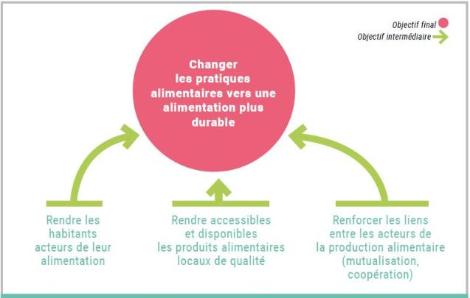Temporary micro markets and restaurant-bar-grocery shop
A model of social and solidarity economy to make quality local food accessible
enero 2019
Fondation Daniel et Nina Carasso (FDNC)
Towards a Europe of territorial food systems ?
This study is extracted from the analysis of twenty-two French and Spanish projects related to new food models, all highlighting different challenges.
In Spain, governance is being built, while French food systems are looking for solutions to change scale. But in both countries, accessibility remains the weak link.
Feedback on the project of the Nantes-based association Ecos, pilot of the MicroMarchés project launched by the city’s Centre Communal d’Action Social.
The Ecos association aims to change the dietary practices of the inhabitants in the targeted neighbourhoods. Beyond the physical and economic accessibility to quality local food, the association raises awareness among these consumers. Cooking workshops are offered and citizens actively participate in the organisation of MicroMarkets.
For ten years, in Nantes (44), the association Ecos has been working on urban ecology, territorial diagnosis, alternative practices, art in the neighbourhoods and the incubation of associations. Identified by the Centre communal d’action sociale as an active player on food issues, in 2014 Ecos will benefit from a grant which will enable it to launch the MicroMarchés (MM) project: distributing ten baskets to people in precarious situations, every week, « at the bottom of their building ». The association quickly hopes to make this initiative viable and open it up to all the inhabitants of the neighbourhood. Discussions were initiated with local producers to strengthen the supply: GAB 44, Terroir 44 and direct farmers.
A second MM opens, followed by a third one.
But the logistics remain fragile.

Partnerships are established with associations in the targeted neighbourhoods to take over the organisation of the weekly MM. Funding is provided by local authorities, public agencies and foundations. In 2017, the association creates a cooperative society of collective interest (Scic) to take over the management of the MM and opens a fixed point of sale, a grocery store-restaurant-bar: La Grande Barge. By formalising this business project, Ecos surrounds itself with economic partners, enabling it to partially detach itself from institutional and civil society players. The operation of the place requires a broadening of the range of products and an increase in the purchasing department.
Opening a « multi-purpose » place to achieve a successful change of scale
The Grande Barge brings together several activities around food: the structure ensures the storage of products, centralises orders and sometimes delivery for suppliers, including farmers. Bar, restaurant and MicroMarchés can thus share the costs and resources. La Grande Barge’s various activities make it possible to reach a more varied and numerous public. With the cooperative structure (Scic), the players in the distribution circuit are more involved in decision-making. Moreover, the opening of this place gives a new visibility to the associative dynamic, which is gaining recognition among the other actors of the social and solidarity economy. Today, La Grande Barge employs four employees for a turnover of €250,000. The margins generated make it possible to contribute to the financing of MicroMarkets.
Consolidating the socio-economic model with a new structure supported by a Scic
Setting up MicroMarkets requires finding suppliers, organising logistics and consulting with partner associations. After three years, three MicroMarkets are operational. Several limitations appear: the very laborious manual ordering process, the willingness to work with direct producers, and not only with integration gardens, the identification of a profitable economic model. The consolidation of the La Grande Barge project, through the identification of a location and a salaried team, gives new impetus to the project. By attracting new clients, the structure increases its income. Financial resources are released to cover the operation of the MicroMarkets.